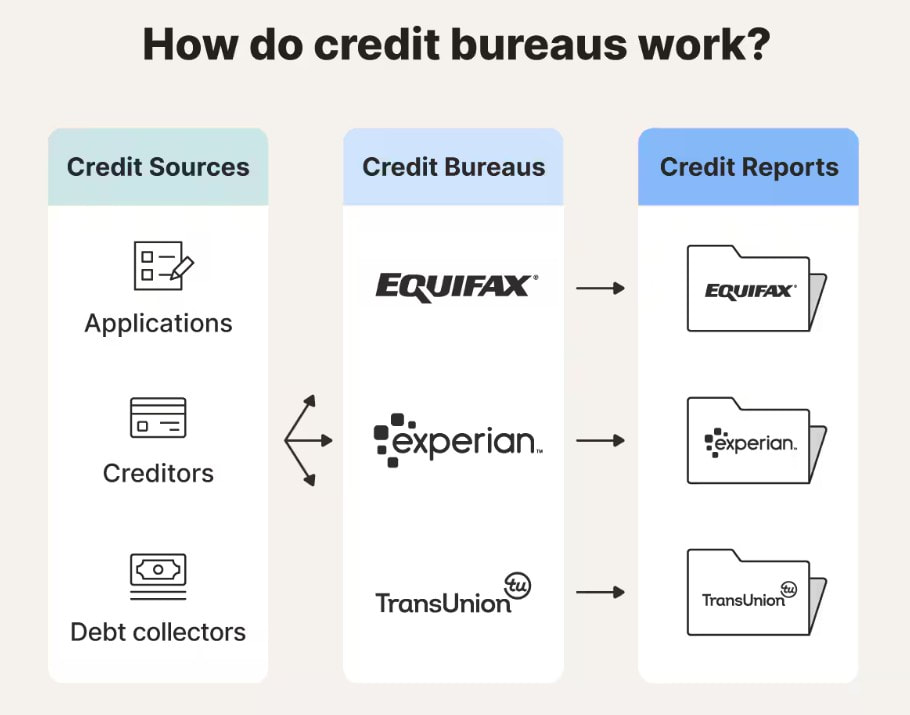|
When it comes to credit, many consumers focus solely on their credit score—but behind every score is a credit report, and behind every report are the three major credit bureaus: Experian, Equifax, and TransUnion. Each of these agencies plays a vital role in how lenders, landlords, employers, and insurers view your financial trustworthiness. But here’s what most people don’t realize: not all credit reports are the same—and the bureaus don’t always agree. To help consumers, business owners, and aspiring homeowners understand the full picture, REI Invest Capital Loan Credit Repair has created this comprehensive guide to explain how each bureau works, how they differ, and why it’s crucial to monitor all three. 📊 What Are the 3 Major Credit Bureaus? The three credit reporting agencies—Experian, Equifax, and TransUnion—are private companies that collect, store, and manage your credit data. They each maintain individual credit files for every consumer, based on information provided by lenders, creditors, utility companies, and public records. These credit bureaus are not government entities, but they are regulated under the Fair Credit Reporting Act (FCRA) to ensure accuracy and protect consumer rights. 🔁 How the Credit Bureaus Work - Although they’re often viewed as a unified system, the credit bureaus are independent organizations with unique business models, algorithms, and data relationships. Here's how they operate: 🔹 1. Data Collection - Credit bureaus do not create your credit activity—they simply collect data reported by creditors, lenders, public agencies, and third-party data providers. Each time you make a payment, miss one, open a credit card, apply for a loan, or default on a bill, the entity managing that account may report the activity to one, two, or all three bureaus. However, reporting is voluntary, and not every lender reports to every bureau. This is why each report may contain slightly different information, even though they’re all tracking the same consumer. 🔹 2. Credit File Compilation - Once the bureaus receive data, they organize it into your individual credit file, linked to identifiers like your:
🔹 3. Scoring Model Application - Credit bureaus apply scoring models—most commonly FICO® or VantageScore—to your file. These models assess how risky you appear based on your:
For example:
🔹 4. Credit File Sales to Third Parties - Credit bureaus sell access to your credit report and score to:
This is also why it’s essential to monitor your reports regularly—errors or outdated items can cost you opportunities you never even knew you lost. 🏛️ The Three Bureaus at a Glance Experian
❗ Why the Bureaus Don’t Always Match - Consumers are often surprised to learn that their credit reports—and even their scores--can differ from bureau to bureau. Here’s why: 1. Not All Lenders Report to All Three BureausSome creditors only report to one or two bureaus. For example, a regional credit union may only report to Equifax, leaving Experian and TransUnion in the dark. 2. Different Scoring Models and VersionsEach bureau may use a different version of FICO or VantageScore, and scoring criteria can vary. That’s why your TransUnion score might show 715, while your Experian score says 690. 3. Update Timing and FrequencyData may be reported at different times to each bureau. A payment made today might appear on Experian this week, but not on Equifax for another 10 days. 4. Errors and File MismatchesMisspelled names, outdated addresses, or mixed-up Social Security numbers can lead to incorrect information being included—or excluded—from your file. REI Invest Capital frequently corrects these types of issues through targeted dispute strategies. 📋 Why You Must Check All Three Credit Reports - Checking one report gives you part of the picture. Checking all three gives you the full story. REI Invest Capital strongly encourages clients to:
🔧 How REI Invest Capital Helps As a leader in personal and business credit improvement, REI Invest Capital Loan Credit Repair assists clients with: ✅ Full three-bureau credit report analysis ✅ Disputes and removal of inaccurate or harmful items ✅ Authorized tradeline programs to strengthen credit files ✅ Rapid rescore strategies for time-sensitive approvals ✅ Personalized education and support for rebuilding credit confidence Whether you're applying for a home, building your business, or repairing damage from the past, understanding what’s on each report—and how it affects your creditworthiness—is the first step. 📞 Need a Credit Report Review? REI Invest Capital, Can Help If you’re unsure what’s on your credit reports—or if you’ve only ever looked at one—REI Invest Capital can help you review, compare, and take action. 📅 Schedule your free 30-minute consultation: 📞 Or call us at (312) 626-0116 🧠 Final Word Your credit score is important—but it’s only as accurate as the data behind it. And that data lives in three different places. By understanding the role each credit bureau plays, how they work, and how to manage all three reports, you gain the clarity and confidence to build a financial future on solid ground. Comments are closed.
|
REI Invest Capital
401 N. Michigan Ave.
Chicago, IL 60611
Office: 312-626-0116
Schedule Calendly HERE
401 N. Michigan Ave.
Chicago, IL 60611
Office: 312-626-0116
Schedule Calendly HERE
Our Services
Understanding Your Credit
Funding
FAQ
Contact us
Understanding Your Credit
Funding
FAQ
Contact us
© 2024 REI Invest Capital - Loan Credit Repair

 RSS Feed
RSS Feed


